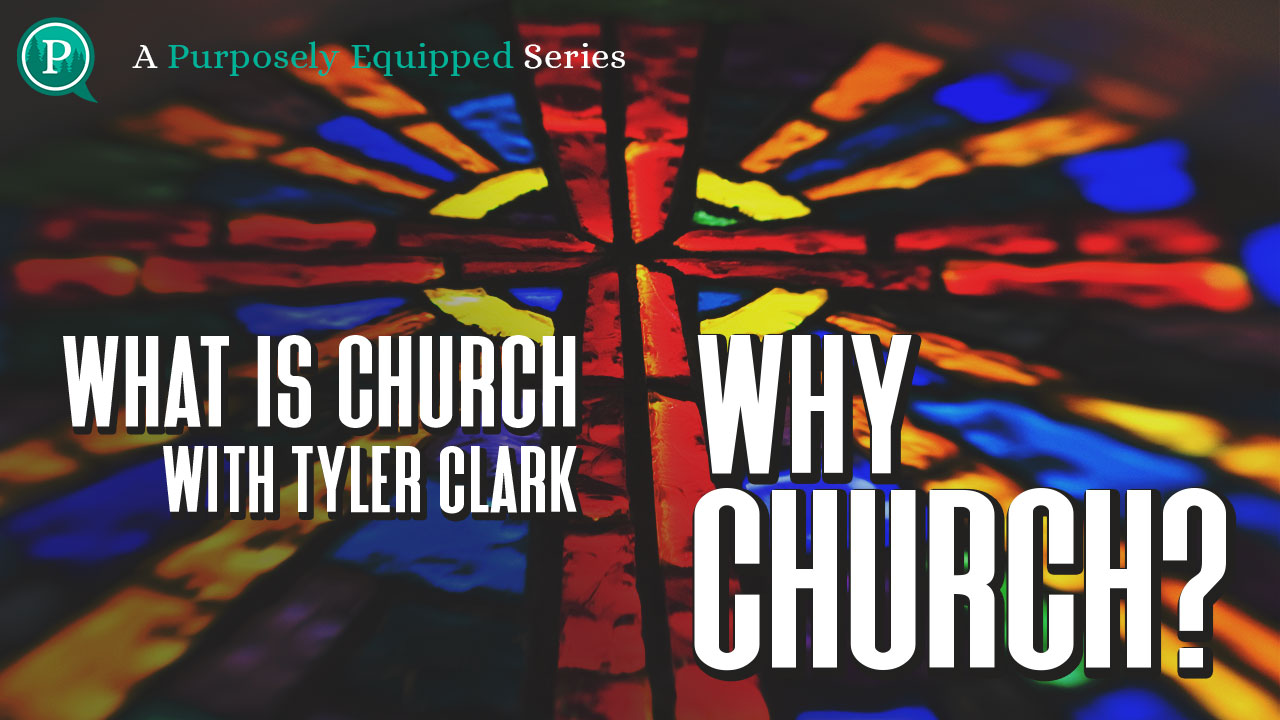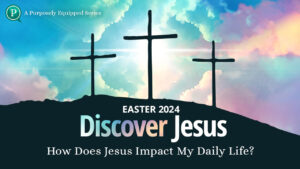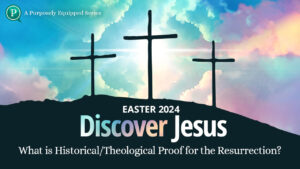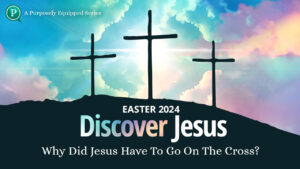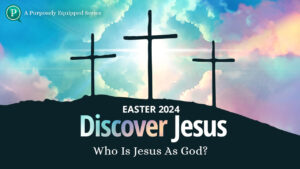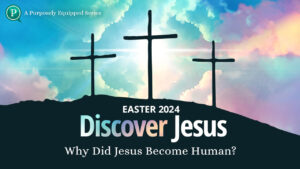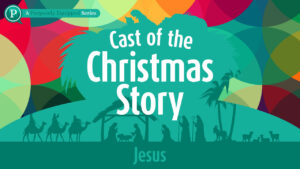We are starting a new series today on the Purposely Equipped podcast digging into church. Mark Holland welcomes Tyler Clark from Table of Hope Church to discuss the topic: What is church? Let’s jump in while we unpack what the original definition of church was, what Jesus says about the church in the book of Matthew and what church is today!
Show Notes:
Find Tyler: Online | Instagram | Facebook
Transcription:
Mark Holland:
Why church? And once again, welcome to the Purposely Equipped series Why Church?, a series of five discussions on different topics and we right out of the gate have a big question and that is what is church? For people listening today, you’re thinking about maybe getting involved in church or switching churches or wonder about the history of church. I think we have a real special treat today. A gentleman who I can tell has a real passion for church and church history and we’ll get into some subject, try not leave people in the dust too much on some of this, but hopefully applicable to your life and where you’re at right now in your life. We have Pastor Tyler Clark of Table of Hope Church in Puyallup. Hi Tyler.
Tyler Clark:
Hello.
Mark Holland:
Good to have you in studio once again. Tell us a little bit about what is Table of Hope Church?
Tyler Clark:
Well, Table of Hope was kind of a response from COVID as kind of things locked down. We launched out in 50s because I was working at a larger church as an associate and we were one of the campuses of our sending church Discovery Community Church in Tacoma. And so we were looking for spaces for 50 people to meet and we launched in Puyallup and Tacoma and Lakewood and in the summer of 2020 we launched three campuses with 90 volunteers. And so after we had launched those and we’d identified leadership and how we could meet safely and the things that we had to ask those questions for, then my pastor came to me and said, Hey, I think you’re a church planter. And I said, well, I don’t know, maybe I am, but maybe I’m not. I’m still finishing my seminary studies. I’d love to give a little bit more time to that before we considered it.
And he came back to me again at the end of the year, about four months later, and he said, I really think this is the future for you. And so my wife and I prayed about it and we had just seen God doing some incredible work even amidst the isolation and separation of COVID where people were bonding together over food. And we started a Food is Free Pantry and met a bunch of our neighbors and started inviting them to our campus. And so when they met us with an opportunity to say, Hey, we’d love to help you plant church, we said, okay, I think we could do that. And so in January of 2021, we started recruiting and started sharing this idea of how do we share the hospitality of Jesus with people? How do we create spaces where people can be known and where really the needs of people are acknowledged upfront? And so we started inviting people into it and people started seeing the vision and that’s how we ended up getting started. On Easter of 2021, Table of Hope was born. And,
Mark Holland:
So literally a table. You started with having meals together.
Tyler Clark:
Absolutely.
Mark Holland:
Okay.
Tyler Clark:
Yeah. And actually it’s still a big part of our ministry today. In our regular Sunday gathering, I think consistent with the New Testament, we have a meal together and so we meet on Sunday evenings at South Hill Baptist and at 5:00 PM we gather around the table and we will have a themed meal, not a potluck, a themed meal.
Mark Holland:
Okay.
Tyler Clark:
So there’s a difference.
Mark Holland:
It’s not a potluck.
Tyler Clark:
Well, sometimes you get three jello salads and one main dish and it’s not quite a meal,
Mark Holland:
Right.
Tyler Clark:
But we have a themed meal together and some icebreaker questions. And then we just think you can worship through eating. You can worship through singing and through preaching and discussing the word. And so we do all those things in our service. And so we are sometimes a two-hour service and our kids are part of our service too. And then we do some specific kids programming to bring the gospel down to their level. We preach a 25-minute message and then we discuss it together. And so there’s this really neat community that’s kind of been called out,
Mark Holland:
Almost like a family meeting.
Tyler Clark:
Yeah. A little bit like a family meeting. And that’s every week.
Mark Holland:
Well, that sounds wonderful. A real different kind of expression. And as we’re looking at this first subject in our series, what is church? We are going to kind of unpack how church started as church talking about the people of God, then it moved more to buildings of God. And maybe that’s all okay in there. But tell us a little bit about your vision and how you wanted to start this discussion.
Tyler Clark:
Well as not only as our expression has shown, my experience in church was a warm and hospitable place. Now I know that’s not the experience that everyone’s had with church, but at eight years old I was,
Mark Holland:
You grew up in church.
Tyler Clark:
I did, but kind of unusually. My brothers and I would go to church sometimes. I’d go to church a lot of times from eight to 17, but my parents weren’t really engaged or interested at all.
Mark Holland:
But you were.
Tyler Clark:
I was. Yep.
Mark Holland:
Were you like dragged along by the neighbor or whatever to church or you just wanted to go to church as a kid?
Tyler Clark:
I wanted to go and when we went, we had a good experience.
Mark Holland:
Okay.
Tyler Clark:
My brothers not so much. They were like, this is school, we’re not interested in this. But God provided a way for me to get to church from eight to 17. And so I was involved in the church but my family kind of wasn’t. And it was just really neat to see the space. It was like I could do all the other things that the youth group kids did and then I could be engaged in this space and God just grabbed my heart. And so I’ve always just had a passion to create spaces where people can be warm and friendly and welcomed. And then eventually I own some different businesses. And you can hear more about that. We did a podcast for Brought Back to Life.
Mark Holland:
Yeah. People are interested more in finding out your story. You did a Brought Back to Life podcast, which is also on Purposely Equipped that people can listen to.
Tyler Clark:
Yeah. And that kind of covers a little bit more of the story of how we kind of came into where we’re at, but for the vision, we wanted to be able to create spaces where people could be known and come to know Jesus. And so that’s how Table of Hope got formed, but it’s really based out of biblical convictions of how we see the New Testament believers working together. And the word that is often used in this space or that is used translated church is ecclesia and this word is translated church, but it has a lot of depth in the meaning for it. You talked a little bit about the difference between the people and the church, and that’s relatively a new idea. From the biblical text, the ecclesia was this called out people. It was essentially where a gathering was happening, an assembly was happening where people were worshiping, where people were Christians, were gathering together to worship and learn and hold each other accountable to following Jesus and learning the way of, and that’s what they called themselves in the beginning was the way. Right.
Mark Holland:
And they met in homes.
Tyler Clark:
They met in homes. There’s some examples through the New Testament that they met in some different places, but generally it was homes. And most of the New Testament letters that are written are written to house churches, which means these congregations are probably less than 50 in most cases. 50 probably would’ve been large.
Mark Holland:
All those epistles in the New Testament, Philippines and Galatians, those were probably home churches in those towns.
Tyler Clark:
Yeah. Somebody that had enough space for a group to gather and then very often they’d eat together and very often they were singing and they were studying the word. And it was this more of an organic and not programmed time that was together that they were sharing life and learning how to live this new life that Jesus had showed them.
Mark Holland:
Speaking of Jesus, he says he will set up his church. He seemed to have a vision for what was going to be coming after he gave his life. And I think there’s an interesting scripture you have in here about what he told to Peter because they say, what are people saying about me? And then Peter makes that wonderful declaration and Jesus said, I will build my church on this idea. And can you tell us that scripture?
Tyler Clark:
Absolutely. Well, if you look in Matthew, you can see in chapter 16 Matthew’s writing to a specific audience and bringing some of these ideas out. And what was really interesting to me is I wanted to know what Jesus had said about the church and I was really surprised to see the only things that Jesus had said was in the book of Matthew. And so there’s this passage in 16 and it picks up in verse 16, but after Jesus ask them, who do you say that I am? The disciples say, who do the people say the son of man is? And some were questioning, is he John the Baptist? Is he Elijah? Is he this historical, like who we should expect? That’s what they were, kind of the question they were kind of answering him with. And so Jesus was like, who do you say that I am?
And I love Simon because sometimes I see myself in Simon. And so Simon says, “You are Christ the son of the living God.” And Jesus answered him, “Yes, blessed are you Simon Barjona for flesh and blood has not revealed this to you, but my father who is in heaven. And I’ll tell you that you are Peter and on this rock I will build my church and the gates of hell shall not prevail against it.” Now there’s an interesting thing that happens in the language that we don’t see because in the Greek here, the word Peter kind of sounds like the word rock. And so I think Jesus is playing on that rock language a little bit. But if we actually look in the Greek, we see this Peter, the Rock and the Ecclesia, these called out ones that Jesus says that he’s going to continue his mission through, which I think is pretty neat.
Mark Holland:
Well, and obviously some denominations and churches through the years have felt like that was Peter being recognized as the first Pope or whatever, but it really isn’t about that. It’s about this idea of Jesus being the son of God. That’s what he meant by on this rock I will build my church, not Peter specifically, but his confession of Christ and this idea of Christ.
Tyler Clark:
Absolutely. Well, and I would probably venture to say that also that Jesus is building his church through the apostles, through the disciples, through the faithful witness of those Christians that are carrying the message forward. So as Peter’s a type in this, it’s also setting the type that Jesus is going to continue to build his church because where’s Peter now?
Mark Holland:
Right.
Tyler Clark:
And so even if we try to argue about maybe authority in some of those kinds of things, and we know some churches have aligned in some of what they think that authority is to be, the idea bigger here is that Jesus is going to continue to work through his sent once to forward his mission.
Mark Holland:
Well, let’s talk about some of these different ideas about church and different expressions. The universal church versus the local church, what do you think is kind of the difference there?
Tyler Clark:
Well, I mean I think that universal idea is talking about the whole kingdom of believers. Now, this isn’t talking about our tribalism that we kind of take on to say, I’m this denomination or I’m that denomination, or these are the things that separate us. It’s actually talking about the thing that unites us, which is our belief in Jesus’s Lord and Savior of our lives.
Mark Holland:
Right.
Tyler Clark:
And so the universal church, we can see some declarations through the New Testament that are working through all believers, not just a specific emphasis of church or a specific emphasis of practice as we kind of see it play out today. One of those words is when we look at Acts 7:38, you can see that Steven, the martyr Steven has given this great historical account and he uses this word ecclesia to talk about the assembly that was waiting at the bottom of the mountain when Moses is giving the 10 Commandments and he’s talking about this assembly of people that believe, and that kind of just opens up this bigger picture because there’s a different Hebrew word that talks about assembly, whereas the church is this New Testament ecclesia kind of sent idea. But it’s throughout the whole Bible that we see this expression of these believers coming together.
And I think it’s a pretty neat way to look at this. Another space that we can look at this as in Ephesians, Ephesians three talks about this in the universal way. It says, “Of the gospel, I was made a minister according to the God’s gift of grace.” This is Paul who’s speaking, “Which was given to me by the working of his power. To me, though I’m the very least of the saints, the grace was given to preach to the Gentiles, the unsearchable riches of Christ to bring to light for everyone what is the plan of the ministry, or excuse me, mystery hidden by the ages of God who created all things.” And here’s the universal piece, “So that through the church, the manifold wisdom of God may be known to rulers and authorities in the heavenly places.”
So what Peter’s literally saying here is the unsearchable riches of Christ, this wisdom, this knowledge of how to follow him and how to live for him. The church is here to make this known to the world. It’s this mission that we’ve been called to and that every church of believers are supposed to be called to help people understand the riches of God.
Mark Holland:
So there was this transition then I always think of Christianity as kind of the fulfillment of Judaism beforehand. The church and what came before are two different things. Or I mean, I don’t want to get into some of these ideas of how the church has taken over from Israel, but it does seem to be this since Jesus left this 2000 years kind of called the Church Age.
Tyler Clark:
Well, I mean, if we follow the Old Testament record of how God was working through, we can kind of follow through some of these special relationships and covenants that he makes throughout the Old Testament into the New Testament. And he works through a family and then he works through a people and then he works through a nation. And the nation’s design was always to be priest, to be representatives of God to the whole world. That’s what Israel was always supposed to do.
Mark Holland:
Yeah.
Tyler Clark:
And of course they always got jealous of their neighbors and just like every human, they fall off,
Mark Holland:
Seemed to kind of get off track.
Tyler Clark:
Yeah. As I think we all do sometimes, right?
Mark Holland:
Yeah. Yeah. Yeah.
Tyler Clark:
And so we see God working through that, but with the desire that the whole world would know him. And so when Jesus comes and brings that restoration of relationship, it takes the mission and furthers it out, brings it out further. And I would say almost more approachable than just to say, Hey, these special chosen people,
Mark Holland:
Were the chosen people. Yeah.
Tyler Clark:
Right. And now the chosen people are those that are chosen by faith, those that make the choice of faith to be able to continue. And that’s beautiful about this expression. It’s a fulfillment of those promises that came through Judaism and then it’s an extenuation to the ends of the earth. I think it’s Acts 1:8 that says to Jerusalem, to Judea and to the ends of the world. That’s the whole point, is to bring this gospel, this message of Jesus’s life-saving message to the whole world.
Mark Holland:
But there’s a lot of freedom within those boundaries though. We were talking before we went on the air that the idea of different churches, different expressions in different areas geographically or otherwise, it seems to be okay with God that different denomination, they didn’t call them denominations back then, but that’s not necessarily not part of God’s plan. It seems to be okay within his, I mean, he doesn’t want us to fight and divide over things, but it seems to be okay for kind of different strokes for different folks in different areas of the world, different ethnic groups. It seems to be okay with God for that to be present.
Tyler Clark:
Well, there definitely does not seem to be one prescribed method of how to do church if we read through the New Testament. And then I think when you read through a book of first Corinthians where Paul’s talking about the difference of gifts and that kind of thing, different churches are going to have different expressions, which I think is appropriate. And actually I think it’s a beautiful thing. I think maybe that some would have some distinctives of maybe lively and full worship. And when I think of worship, I’m thinking specifically in singing or some of those kind of ways, maybe more of an experience where there’ll be some other churches that have incredibly gifted teachers, and these aren’t to the exclusion of either one. But those differences, we’ll be able to reach different people. And so even in the New Testament, I think that the expression of the church at Corinth is probably going to look different than the church at Philippi because the people are different.
Mark Holland:
Right.
Tyler Clark:
And the history around them is different, and how they reach their neighbors is probably going to look different. And so that’s what I love about this expression of the universal church is that there’s commonalities all throughout. Now there’s some lines, right, some things that we’re like, Hey, this is where it stops being church. This is where we maybe look for different, or people are looking for different revelation or trying to put different authority in different things. But I think that there is a beautiful diversity and variety allowed for what church expression looks like. So where somebody could do a dinner church like we do at Table of Hope, that would be in contrast to a different church that really values the standing and the sitting and the calm,
Mark Holland:
Sacraments.
Tyler Clark:
Yeah. And maybe some of those liturgical kind of practices. Sure.
Mark Holland:
Yeah. That’s God’s wisdom that he wants people to, well, I think it’s even in the, if I can say kind of the psychological makeup of people. Some are more thinkers, some are more feelers, and it seems like different people will gravitate toward different expressions just even based on that, the way people are made.
Tyler Clark:
I think so. And I think there’s a freedom in that space where I think there’s, we have a value at our church called Mosaic family, and that value means that we pursue people that think, act and look differently than we do. And so we see that expression within our church where some maybe are a little bit more traditional or more untraditional, but it also means that we work with other churches to be able to celebrate together. We had a worship night with some other local churches and we all came together and worship together. We have different doctrinal definitions, but we can work together to all worship the same God that we worship.
Mark Holland:
And that’s maybe different from what’s come to be known as the ecumenical movement, where some of those extremes, they just throw out all Christian truth and they just kind of like, well, you’re a Buddhist, I’m a Hindu. That’s not what we’re talking about.
Tyler Clark:
No, I think there are some core non-negotiable things that we would look through and we can see that consistent with the New Testament, a high view of the authority of scripture that guides how we operate. Now, because there’s freedom, doesn’t mean that everything’s permissible because even Paul says not everything is beneficial. But I do think that there are some core truths that Jesus is who he says he is, and that we hold scripture in the same way, and there’s a lot of collaboration instead of territorialism that can happen. And I’m seeing more of that with some of the younger church planters and some of these other,
Mark Holland:
Yeah, I think so.
Tyler Clark:
New pastors coming up that are more collaborative.
Mark Holland:
Well, that’s a good move toward, because who knows, we have a lot of big church buildings and denominations, but we may be going back more toward more of a home church, house church kind of approach in the future, particularly with the oppression that’s happening. I mean, many countries in the world are already like that, kind of the underground church and house churches because they have to, by necessity be that kind of expression.
Tyler Clark:
Yeah. There was a church father that had written something that said that the blood of the martyrs was the seedbed of the church. That basically that the fruit of the gospel could go further where there was persecution and we’re seeing that like the church in China exploding. We see the church in Africa that is just growing leaps and bounds where people are learning and hearing the gospel and living it and learning the lifesaving message of Jesus, which is encouraging. And I think that there’s a lot of things that we can learn from those spaces, but I think all of it comes back to this relationship, not just this relationship between me and Jesus, but this relationship with me and Jesus followers is called out.
Mark Holland:
Well, again, this difference between the universal church and the local church expression. Do you want to kind of expound again on maybe what some of those differences are there? The local church, what does that mean? What does that look like?
Tyler Clark:
Well, I think the universal is the umbrella that all Christ believing churches kind of fall under, and then the local church is the local expressions of that. We see that in Colossians, Peter writes this as he’s closing. He says, “Give greetings to my brothers at Laodicea and to Nympha and the church in her house.” Right. This house church kind of idea, this expression that’s a local expression of this and acknowledgement of like, Hey, that is a gathering. Right. If it was just written always universally, then it’d be a different case. But we see these letters written to Philippi, to Corinth, we see to even to the Romans, these churches that received the letter that gives us so much of the doctrine and understanding of God’s character that’s come through these local expressions. Even Paul’s relationship with Timothy, we see that he was sent out and he tells Timothy, he says, or he is telling the church that, “You should receive him well. My beloved and faithful child in the Lord and remind you of my ways in Christ and teach them everywhere and every church.”
So this expression that there’s these local churches that need to be continuing to look at the word and being refreshed in that space and reminding them of the way of Jesus, there’s these local pieces. I think I saw that as I did some research that Paul specifically took three different missionary journeys, travels over 7,000 miles and plants, 14 different churches, local expressions to reach. So the church at Corinth is going to have a different composition and a different pursuit than the church at Rome where there’s a lot more government and people that live there, and then the composition is different. And so the local church is this expression of Jesus whose still the head, the head of the universal church, the head of the local church that helps this local church have its expression for its mission.
Mark Holland:
Yeah. And speaking of mission, that’s okay. Again, in the past, maybe missionaries have gotten a bad rep because they come in and want to change, make the locals adapt to Western ideas of what a church is. But it’s okay for these different missionary plans to adopt to some degree anyway, what that culture is like and what that looks like, what different words for God, may be different things like that that are okay in a missionary environment.
Tyler Clark:
I think so, and I honestly would think that that missionary term is something that we need to be thinking of just as much locally as we do globally, that when we are in relationship with our neighbors and trying to represent who this God is, that there’s going to be different methods for us to be able to share how to worship and how to engage with people within the church. And one of the people, is one of my heroes, is St. Patrick, and what I love about how his ministry was, and it was different than the Roman Catholic Church in his time, was he would go outside of the community, serve the community, build relationship, and then tell them about the Jesus that led him to do that. And then they would come to know the gospel and they would revitalize that whole community to know the gospel. And then they would take a couple guys with them, leave a couple guys behind and leaving it better than they found it and they basically shared Christianity with the whole island of Ireland by this little move outside, serve him, love him.
Mark Holland:
Yeah. Interesting with him too. He was quite persecuted there, and yet he went back to them.
Tyler Clark:
Yeah.
Mark Holland:
And helped them to kind of see the light, so to speak. There’s another thing I’ve noticed in some of your notes here. You came up with this idea of when this transition from church being the people of God to church being the building of God, and we have buildings all over the world, some beautiful buildings. It seemed like in many ways that is what even began. The foundation of different civilizations was all kind of wrapped around the church building, and there’s nothing, that’s wonderful architecture and all of these different areas that it touched, but when do you think that began to happen from church being people versus church being a building?
Tyler Clark:
Well, it seems pretty clear from the New Testament that the word is that called out people. That’s the church, and that’s the word that is used church in the New Testament. There’s some different scholars that can think that some of the language is how it’s evolved. And basically when Christianity was made the national religion for Rome, then a lot of things started to shift. Places of worship were established because you didn’t have to worry about persecution. And then I think some of the culture started to shift at that space. I think it could have been as late as about 1500s when the idea started shifting to church was a people to church was a building.
Mark Holland:
Because I think even today, this persists, the church is a building.
Tyler Clark:
I think there’s more confusion today than there has been historically. I mean, if I said church, now you may be wondering if I’m talking about a social organization, a worship service or a building, and then culture’s even taken it in different ways now where it’s like church can mean agreement and replace the word amen. Or church can talk about a house of ill repute or a strip club in common use. A church has this breadth of meaning that doesn’t mean what it actually started out to mean, which is always the people that were called out on God’s mission. And so it definitely can be confusing when you’re talking about the church and it’s that noun versus that more like that sent people.
Mark Holland:
What is church? The discussion today on this series. We’re talking with Pastor Tyler Clark from Table of Hope Church in Puyallup. And again, you guys move around. You said you have kind of an interesting perspective on this because you don’t own a building currently anyway. You wouldn’t be opposed to that eventually, but the way you’re kind of sent out is very much the way you’re doing church.
Tyler Clark:
Yeah, I mean, I came up going to churches and the buildings and groups of people in those churches, and then we came on to Discovery in Tacoma and they didn’t have a building, their philosophy of ministry was to be just a sent people. And so they do what they call mobile church where they set up and tear down every Sunday. And what I thought was really interesting is instead of worrying about deferred maintenance and sometimes programs and some of the other things that distract us their focus,
Mark Holland:
And a mortgage.
Tyler Clark:
And yeah. And real life expenses,
Mark Holland:
Right.
Tyler Clark:
Their focus was more on being family and about practicing these ways. And it was really attractive, their sense of family to us. And that was really intriguing for us. And so for 20 years, they’ve been a mobile church without a building because they are a sent people. And so we took in that same vein, that kind of philosophy of how do we equip everyday missionaries to be great neighbors in our context now, and it doesn’t need a building for us to be church. If two or three or 10 are gathered even in my house, that we can have church because we are a group of sent people on God’s mission.
Mark Holland:
Yeah, it’s a wonderful distinction. Nothing wrong with having a church and like I was saying, a lot of times the church was the first building built in a new community, and churches can feel a sense of, well, God is in this place, architecturally stained-glass, whatever. But again, that all kind of has to do with, again, meeting the needs of that particular group of people. What do they want from their expression of church? And that’s okay. God seems to give again these kinds of freedoms. You were saying too, what’s a church? Church is people who are gentle and the fruits of the spirit and explain what you were saying there too again.
Tyler Clark:
Well, I think that freedom of expression and how a church is defined in practices is another representative of the way that we can operate as believers together. Now, the idea of these [inaudible 00:27:50] people would be that we’re living together and sharpening each other to live more for Jesus. And so we should be more and more defined by those fruits of the spirit. Love, peace, patience, kindness, goodness, all those things we’re not good at.
Mark Holland:
Yeah.
Tyler Clark:
All the things I’m not good at, if I’m honest. It’s me embracing the spirit’s lead in my life when I see those fruits, and that’s how the churches should be working together, multiples of us, and there’s going to be conflict. That’s what was incredible about Matthew’s accounts. Both of them, where Jesus talks about it in Matthew 16 and again in Matthew 18 is they both were in the context of conflict, of how the two believers who don’t work together, how do they live in harmony together? And there’s a lot more written about that, but I think a lot of times we think, oh, the church should have no conflict. That’s actually not the case. It’s that conflict that helps us grow stronger. It’s just navigating it in a fruitful way.
Mark Holland:
Yeah.
Tyler Clark:
And so I think as much as there’s a freedom in expression of church, there’s a freedom in some of our expression and following Jesus that the way that Mark you’re going to follow Jesus is going to maybe look a little different than the way that I follow Jesus. Now, I’m not talking about our permissibility of sin, but I’m just saying maybe you’re going to connect with God on a hike and I’m going to connect with God in a book. And there’s a big gap sometimes in that we have to understand that we connect with God in different ways and churches can help us do that.
Mark Holland:
And that’s okay. It seems to be again okay with God. The motivation a lot of times of people is to be more authoritarian. Everything must look this way, be done, and that’s really a foreign idea, this authoritarian instinct that people have.
Tyler Clark:
Well, and that’s kind of the context that Jesus came into. Right. I mean, the Pharisees were so eager to get people back to follow Jesus that they had this list of rules that you could and couldn’t do, that you even needed to tithe on your garden.
Mark Holland:
Right.
Tyler Clark:
Right. That they were focused more on the rules than they were on what the relationship looked like. And so I think it is the beautiful expression of diversity that allows us to be able to reach this very diverse world that we live in.
Mark Holland:
Well, as we bring this in for a landing then, what do you think the church should look like today?
Tyler Clark:
Well, I think we got to get back,
Mark Holland:
We’re kind of talking about it but,
Tyler Clark:
Yeah, I think we kind of get back to this idea that we are a sent people and that we need to prepare for maybe disagreements and conflicts at times, but that we are unified by Christ.
Mark Holland:
Disagree agreeably.
Tyler Clark:
Absolutely. Absolutely. I think that that’s an important,
Mark Holland:
Which is not the trend these days.
Tyler Clark:
No.
Mark Holland:
But it can be.
Tyler Clark:
Well, and I think it should be. We should think more that universal church. How does my local expression participate in this global, because it’s one kingdom. It’s his kingdom, and we are all hoping to build his kingdom with him leading our local expression of the church.
Mark Holland:
Jesus said, I will build my church on this rock of what Peter said, that you are the Christ. So that obviously is the foundation stone. Jesus is that cornerstone that the builders rejected, as they say, and again, building both literally a structure but also figuratively as we’re talking about a universal church. Well, so wonderful talking with you this week, Tyler, this time Tyler. Again, tell us a little bit more about what you’re doing in Puyallup. How can people find your church Table of Hope?
Tyler Clark:
Yeah, so I mean, our desire, our mission is to use our tables to share the gospel. And that doesn’t mean that everybody has everybody over for dinner, although there are some that do that. It could be playing video games, it could be playing card games, and not just games, but we just want to bring the gospel to where we live, work, learn, and play and in all those places represent Jesus faithfully. And so if you were to visit us, you could find us at tableofhopechurch.com. It gives you an idea of a little bit of what our gathering looks like and what some of our mission of how we’re trying to reach out. Some of the gospel space we’re developing has been the Puyallup Junior Vikings football and cheer club. My kids and my family engage in that space, and then we do a lot of things with South Hill and partnering with some of these other churches, just trying to reach Puyallup, reach some of the homeless that are in Puyallup, and just really help share the life-giving message of Jesus with a lost and dying world.
Mark Holland:
What is church? I think we’ve covered a good portion of at least some of these basic ideas and worth maybe more investigation on your part as you’re listening to this Purposely Equipped series Why Church? Again, thank you so much for talking with us today, pastor Tyler Clark of Table of Hope Church in Puyallup. And you’ve been listening to the first installment in our Purposely Equipped series, Why Church? And the question, what is Church with Tyler Clark, pastor of Table of Hope Church in Puyallup. For more details about the church, visit them at tableofhopechurch.com. Please leave us a review of this message so more people can discover this podcast and find more episodes of Purposely Equipped at onpurposely.com.
Follow this podcast:

